
Algeria’s historic role as a pioneer in recognizing the State of Palestine is coming into focus once again, as French President Emmanuel Macron announced plans to officially recognise Palestine in September 2025.
This move follows decades of widespread African support that began with Algeria’s landmark hosting of the Palestinian declaration of independence in 1988.
On 15 November 1988, in Algiers, Yasser Arafat, then leader of the Palestinian Liberation Organization, proclaimed the independence of Palestine during a session of the Palestinian National Council.
This momentous declaration referenced United Nations Resolution 181 of 1947, which proposed the partition of Mandatory Palestine into two states. Algeria’s choice to host the proclamation was deeply symbolic.
As a former French colony that achieved independence in 1962 after a brutal liberation war, Algeria saw natural solidarity with the Palestinian struggle for self-determination.
Then-President Chadli Bendjedid welcomed the Palestinian liberation movement, recognising parallels between the two peoples’ fights against occupation and colonial rule.
The declaration sparked a wave of rapid recognition across Africa. On the same day, Algeria, Morocco, Tunisia, and the Sahrawi Arab Democratic Republic recognised Palestine, with Madagascar and Zambia following shortly after. Within a year, the vast majority of African nations had extended official recognition, framing the Palestinian cause as intertwined with the broader anti-colonial and liberation movements across the continent.
South Africa joined the movement in 1995 after Nelson Mandela’s election as president. Mandela, who likened his people’s struggle against apartheid to the Palestinian fight for freedom, visited Gaza in 1999, famously stating: “Our freedom is not complete without the freedom of the Palestinians.”
Today, only Cameroon and Eritrea have yet to officially recognise Palestine, making Africa the most unanimous continent in support of Palestinian statehood. While this broad recognition has not altered realities on the ground, it affirms a key principle: peace negotiations must focus not on the existence of a Palestinian state, but on the practical terms of coexistence with Israel.
Africa’s early and united stance has set a precedent now gaining momentum in Europe and beyond, as the international community reconsiders its approach to the Israeli-Palestinian conflict.



